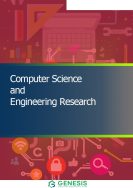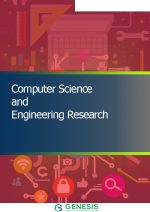Policy
Aims and scope
Computer Science and Engineering Research (CSER) is a premier, international peer-reviewed, open-access journal dedicated to advancing the frontiers of knowledge in all areas of computer science and engineering. With a commitment to excellence, the journal catalyzes disseminating cutting-edge research and fostering innovation in the field. The aims and scope are to provide a platform for researchers, practitioners, and industry professionals to share their latest findings, insights, and methodologies across a broad spectrum of topics, including but not limited to,
Cyber-physical systems: Research on the integration of computational and physical processes, including real-time systems, control theory, and cyber-physical infrastructure.
Bioinformatics and computational biology: Computational methods and algorithms for analyzing biological data, genomics, proteomics, systems biology, and biomedical informatics.
Cloud computing and big data: Architectures, platforms, and algorithms for cloud computing, distributed systems, large-scale data analytics, and data-intensive computing.
Quantum computing: Theoretical and practical aspects of quantum computing, quantum algorithms, quantum information theory, and quantum machine learning.
Natural language processing: Techniques and applications for understanding, generating, and processing human language, including sentiment analysis, machine translation, and dialogue systems.
Computer vision and pattern recognition: Image processing, computer vision, pattern recognition, object detection and tracking, and visual perception.
Internet of Things (IoT) and cyber-physical systems: Design, implementation, and applications of IoT systems, including sensor networks, smart cities, and intelligent transportation systems.
Robotics and autonomous systems: Autonomous navigation, robot perception, robot learning, swarm robotics, human-robot interaction, and robotic applications in various domains.
Software-defined Networking (SDN) and Network Function Virtualization (NFV): SDN architectures, protocols, and applications, NFV technologies, network virtualization, and network management.
Security and privacy: Security and privacy issues in computer systems, cryptography, network security, information security, privacy-preserving technologies, and secure software engineering.
Computational intelligence: Evolutionary computing, swarm intelligence, artificial immune systems, fuzzy systems, and their applications in optimization, modeling, and decision-making.
High-Performance Computing (HPC): Parallel and distributed computing, HPC architectures, performance modeling, scientific computing, and applications in diverse domains.
Blockchain and cryptocurrency technologies: Research on blockchain architectures, consensus mechanisms, smart contracts, decentralized applications (DApps), cryptocurrency protocols, and their applications in finance, supply chain management, healthcare, and beyond.
Artificial intelligence and machine learning applications: Exploration of AI and machine learning algorithms, models, and techniques for solving real-world problems in various domains, including healthcare diagnostics, natural language processing, robotics, autonomous systems, and personalized recommendation systems.
Human-Computer Interaction (HCI) and User Experience (UX): Studies on HCI principles, usability testing, user interface design, interaction techniques, and UX evaluation methods to enhance user satisfaction, productivity, and engagement in software and interactive systems.
Edge computing and Internet of Things (IoT) security: Research on edge computing architectures, protocols, and security mechanisms for IoT devices and systems, including edge intelligence, edge analytics, edge caching, and edge computing applications in smart environments and industrial IoT.
Social computing and online communities: Investigations into social computing platforms, online communities, social network analysis, sentiment analysis, opinion mining, and social media analytics to understand human behavior, social interactions, and information diffusion in online environments.
Computational sustainability: Interdisciplinary research on computational methods, models, and algorithms for addressing sustainability challenges, including environmental conservation, renewable energy systems, sustainable agriculture, and climate change mitigation and adaptation strategies.
Data privacy and ethics in AI: Exploration of ethical considerations, biases, fairness, transparency, and accountability in AI and machine learning algorithms, as well as privacy-preserving techniques, data anonymization, and regulatory frameworks for protecting user privacy and data rights.
Cybersecurity in critical infrastructure: Research on cybersecurity threats and defenses for critical infrastructure systems, including energy grids, transportation networks, healthcare systems, financial institutions, and industrial control systems, to mitigate cyberattacks and safeguard national security.
Augmented Reality (AR) and Virtual Reality (VR) technologies: Studies on AR and VR technologies, applications, and interaction paradigms for immersive experiences, training simulations, virtual prototyping, visualization, education, and entertainment.
Ethical hacking and penetration testing: Research on ethical hacking methodologies, penetration testing tools, vulnerability assessment techniques, red teaming exercises, and cyber incident response strategies to enhance the security posture of organizations and protect against cyber threats.
Computational neuroscience and Brain-Computer Interfaces (BCI): Exploration of computational models of the brain, neural networks, brain imaging techniques, and BCI technologies for brain-controlled interfaces, neuroprosthetics, assistive technologies, and cognitive enhancement.
Green computing and sustainable ICT: Investigations into energy-efficient computing architectures, low-power devices, renewable energy-powered data centers, e-waste management, and sustainable practices in ICT to reduce carbon emissions and minimize environmental impact.
Computer Science and Engineering Research welcomes original research articles, survey papers, review articles, case studies, editorials, and technical notes that significantly contribute to the advancement of computer science and engineering disciplines. We encourage interdisciplinary research that bridges computer science with other fields, fostering collaboration and innovation. The journal’s aims and scope is to facilitate knowledge exchange and stimulate intellectual discourse, thereby shaping the future of computer science and engineering.
Do you have any question? Ask us


